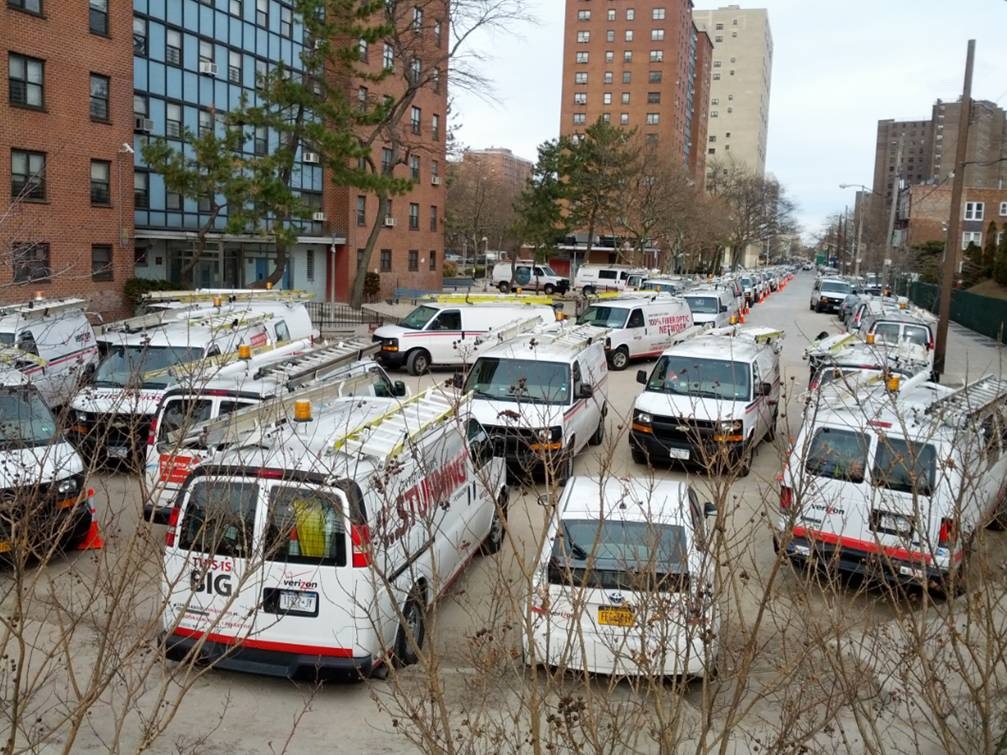Thursday, October 15, 2015

In 2008, Verizon signed a franchise deal with the city that promised to deliver fiber optic technology to virtually every interested household in the city by June 30, 2014. Today, 22 percent of city households remain without internet, and Verizon has tens of thousands of outstanding requests for FiOS installation, particularly in low income and outer-borough regions.
At a City Council oversight hearing yesterday, representatives from Verizon said the company has fulfilled its promise to lay the groundwork for city-wide fiberoptic service "one thousand percent."
Yet they failed to offer any real explanation as to why they have yet to make significant progress toward providing FiOS to every household in the city.
Verizon reps Leecia Eve and Kevin Service stated at the hearing that Verizon has unquestionably met its promise to "pass" all households in the five-borough area, which essentially means extending the fiber so that a building could theoretically then be connected to the network.
As one councilmember pointed out, that's like installing water pipes but not hooking them up to individual apartments: the water's flowing on by, but no one can actually drink it.
"We consider it to be passed if we're within the realm of substantial fiber placement," Service said when pressed on how the term is actually defined. "I'm not a lawyer, but here's what I would say: we're passed if, when we get the request for service and have the necessary rights of way, what we have left to do does not create a delay in bringing service to that customer. Under that Kevin Service Definition, we've passed every household."
Once a household has been "passed," under that Kevin Service Definition, installation should be relatively quick and hassle-free. But an audit released this summer deeply contradicts Service's claim: there are currently 42,000 outstanding requests for FiOS installation, 75 percent of which have been outstanding for over a year.
Verizon claims that the main obstacle here is that individual landlords are refusing access. However, city residents present at the hearing-and council members speaking on their behalf-suggested that the company is prioritizing more socioeconomically advantaged areas-for example, between 135th and 219th streets on Broadway, only one building gets the FiOS network.
According to the Communications Workers of America union, which represents Verizon workers in New York-many of whom went on strike in 2011 to protest the demands of their contracts with the company-service is particularly difficult to get in Chinatown, Washington Heights, Bedford Stuyvesant, Carroll Gardens, Park Slope, Prospect Heights, Jackson Heights, Bay Ridge, Bensonhurst, and Sunnyside, among others.
"They tend to blame landlords," CWA representative Pete Sikora told Gothamist. "They tend to blame everyone but themselves. They didn't have a gun held to their heads; they signed that agreement willingly, because they want to make more money. What they're doing here is effectively picking and choosing which streets to serve."
Brooklyn Councilman Vincent Gentile, who represents Bay Ridge, Dyker Heights, Bath Beach, and Bensonhurst, also suggested that these delays are the result of Verizon prioritizing wireless service over FiOS, given that it announced earlier this year that it would begin focusing capital on expanding wireless, and decided in 2010-two years after its franchise deal with NYC-that it would stop rolling out FiOS to new areas.
Found In:
